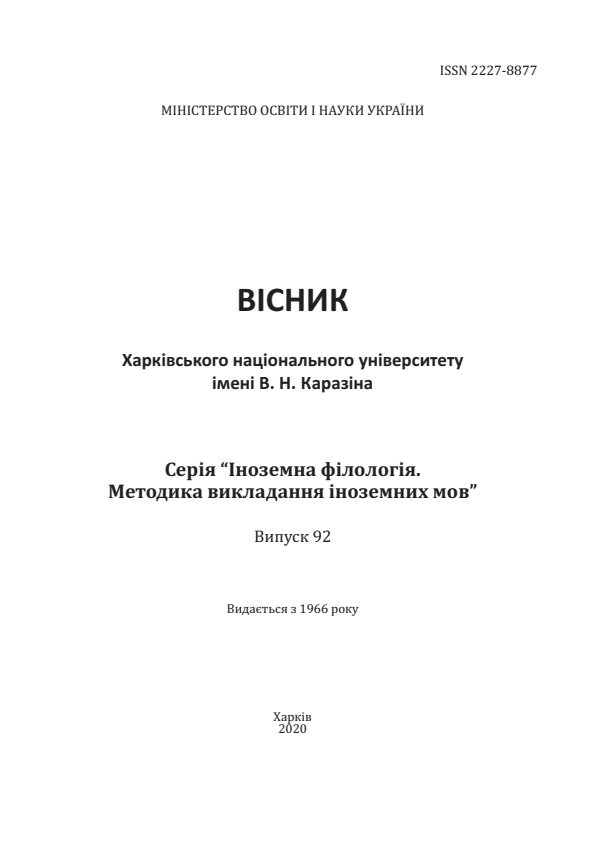Carnival violation of stereotypic norms as a way to eco-consciousness (based on the English-language animated discourse "Zootopia")
Abstract
The article focuses on the problem of carnival violation of simplified and generalized ideas about the world in the English-language animated discourse of the film "Zootopia". The question of carnival violation of stereotypes is for the first time studied in terms of ecological or non-ecological impact on consciousness. The article consistently considers the problems of development of ecological consciousness; stereotype as a tangible result of the processes of simplification and generalization in the common consciousness of people which prevents the development of "healthy" interaction between people and with the natural world. In what way animation discourse: embodies the features of the carnival defined by M. Bakhtin; exposes the shortcomings of people through the prism of stereotypes about animals and due to its paradoxical nature helps to establish the ecological norm. The material of the English-language animated discourse of the film "Zootopia" examines cooperation of carnival elements: ambivalence, universality, grotesqueness, symbolism and corporeality with verbal and nonverbal modes, and their influence on infraction and ridicule of stereotypes; how in the result of the carnival violation of stereotypical norms a new ecological norm is formed, which contributes to the ecoliteracy increase in society, encourages to solve environmental problems and promotes the establishment of "healthy" relationships with nature and its phenomena.
Downloads
References
/References
Bahtin, M. M. (1990). Fransua Rable i narodnaja kul'tura srednevekov'ja i Renessansa. M. : Hudozhestvennaja literatura, 199–206. (in Russian)
Bronnikova, D. A. (2017) Podhody k izucheniju ponjatija'stereotip'v sovremennoj lingvistike. Redakcionnaja kollegija, 253. (in Russian)
Ivanova, E. V. (2015). Lingvokognitivnoe modelirovanie jekologicheskogo diskursa. Obshhestvo s ogranichennoj otvetstvennost'ju FLINTA, 176. (in Russian)
Lyubymova, S. A. (2019). Sociokul`turni stereoty`py` v lingvokognity`vnij parady`gmi. Visny`k Mariupol`s`kogo derzhavnogo universy`tetu. Seriya: Filologiya, (20), 190-197. (in Russian)
Morozova, E. I. (2017). Ekologichny`j pidxid do analizu nepravdy`vy`x vy`slovlen`.: VPCz «Ky`yivs`ky`j universy`tet», 258–266. (in Ukrainian)
Pasynok, V. G., Samoxina, V. O., & Morozova, E. Y`. (2017). Ekolingvisty`chny`j pidxid do analizu inozemny`x mov ta pedagogichnogo procesu yix navchannya v ukrayins`ky`x vy`shax. 128–132. (in Ukrainian)
Samokhina, V. O. (2019). Kreaty`vna dy`skursy`vna osoby`stist` v ekosy`stemi tvorchoyi diyal`nosti. Visny`k Xarkivs`kogo nacional`nogo universy`tetu imeni VN Karazina. Seriya: Inozemna filologiya. Metody`ka vy`kladannya inozemny`x mov, (90), 19–26. (in Ukrainian)
Samokhina, V. O. (2012). Zhart u suchasnomu komunikaty`vnomu prostori Vely`koyi Bry`taniyi ta SShA: tekstual`ny`j i dy`skursy`vny`j aspekty` (Doctoral dissertation). 360. (in Ukrainian)
Samokhina, V. O. (2018). Karnavalizaciya u fokusi lingvokreaty`vnoyi diyal`nosti Homo Artifex. Visny`k XNU imeni VN Karazina. Seriya: Inozemna filologiya. Metody`ka vy`kladannya inozemny`x mov, (88), 26–34. (in Ukrainian)
Capra, F. (1996). The web of life: A new synthesis of mind and matter. HarperCollins. 289–295.
do Couto, H. H. (2017). Ecosystemic linguistics. In The Routledge Handbook of Ecolinguistics (pp. 149-161). Routledge. 149–161.
Fill, A. (1998). Ecolinguistics – State of the art 1998. AAA: Arbeiten aus Anglistik und Amerikanistik, 3–16.
Fill, A. (2015). „Language Creates Relations Between Humans and Animals: Animal Stereotypes, Linguistic Anthropocentrism and Anthropomorphism“. Tiere, Texte, Transformationen. Kritische Perspektiven der Human-Animal Studies. Bielefeld: Transcript (Human-animal studies), 179–192.
Lippmann, W. (1993). The phantom public. Transaction Publishers.
Mühlhäusler, P. (2002). Linguistic ecology: Language change and linguistic imperialism in the Pacific region. Routledge.
Stibbe, A. (2015). Ecolinguistics: Language, ecology and the stories we live by. Routledge.
Howard, B., & Moore, R. (Directors) (2016). Zootopia [Motion Picture]. United States: Walt Disney Studios.
Бахтин М. М. Франсуа Рабле и народная культура средневековья и Ренессанса. Москва : Худ. лит., 1990. 544 с.
Бронникова Д. А. Подходы к изучению понятия «стереотипов» современной лингвистике // Актуальные проблемы современной лингвистики глазами молодых ученых: материалы IX Всероссийского научного. Уфа : РИЦ БашГУ, 2017. 284 с.
Иванова Е. В. Лингвокогнитивное моделирование экологического дискурса: монография. М. : ФЛИНТА : Наука, 2015. 176 с.
Любимова С. А. Соціокультурні стереотипи в лінгвокогнітивній парадигмі // Вісник Маріупольського державного університету. Серія: Філологія, 2019. №. 20. С. 190–197.
Морозова О. І. Екологічний підхід до аналізу неправдивих висловлень // Мовні і концептуальні картини світу. Вип.55. Київ: ВПЦ «Київський університет». 2015. С. 258–266.
Пасинок В. Г. Еколінгвістичний підхід до аналізу іноземних мов та педагогічного процесу їх навчання в українських вишах [Текст] / В.Г. Пасинок, О.І. Морозова, В. О. Самохіна // Якісна мовна освіта в сучасному глобалізованому світі: тенденції, виклики, перспективи: матеріали І Всеукраїнської науково-практичної конференції, м. Суми, 23–24 листопада 2017 р. Суми: СумДУ, 2017. С. 128–132.
Самохіна В. О. Жарт у сучасному комунікативному просторі Великої Британії та США: Монографія. Вид. 2-е, перер. і доп. Х: ХНУ ім. В. Н. Каразіна, 2012. 360 с.
Самохіна В. О. Карнавалізація у фокусі лінгвокреативної діяльності Homo Artifex // Вісник ХНУ імені В. Н. Каразіна. Серія: Іноземна філологія. Методика викладання іноземних мов. Харків, 2018. Вип. 88. С. 26–34.
Самохіна В. О. Креативна дискурсивна особистість в екосистемі творчої діяльності // Вісник ХНУ імені В. Н. Каразіна. Серія: Іноземна філологія. Методика викладання іноземних мов. 2020. № 90. C. 19–26.
Capra F. The Web of Life: A New Synthesis of Mind and Matter. London: Harper Collins, 1997. Р. 289–295.
Couto H. H. do. Ecosystemic Linguistics// Eco Systemic Linguistics. The Routledge handbook of ecolinguistics / ed. by Alwin F. Fill, Hermine Penz. Description: New York, NY: Routledge, 2018. 458 p.
Fill A. Ecolinguistics – State of the Art. AAA Arbeitenaus Anglistik und Amerikanistik. 1998. Vol. 23. № 1. 1998. P. 3–16.
Fill A. Language Creates Relations Between Humans and Animals: Animal Stereotypes, Linguistic Anthropocentrism and Anthropomorphism . Tiere, Texte, Transformationen. Kritische Perspektiven der Human-Animal Studies. Bielefeld: Transcript (Human-animal studies). 2015. Р. 179–192.
Lippmann W. Public Opinion. New York: Macmillan,1922. 427 p.
Mühlhäusler P. Linguistic Ecology. London, New York : Routledge, 1996. 396 p.
Stibbe A. Ecolinguistics: Language, ecology and the stories we live by. Routledge, 2015. 448 p.
Howard, B., & Moore, R. (Directors) Zootopia [Motion Picture]. United States: Walt Disney Studios, 2016.




